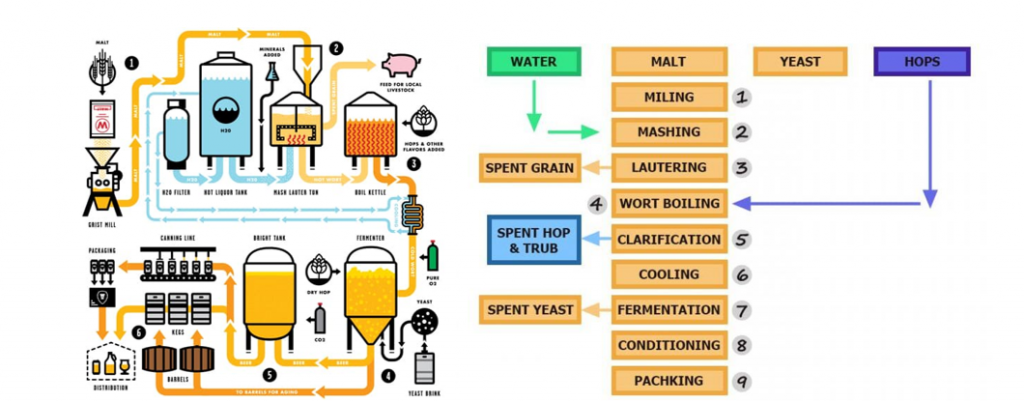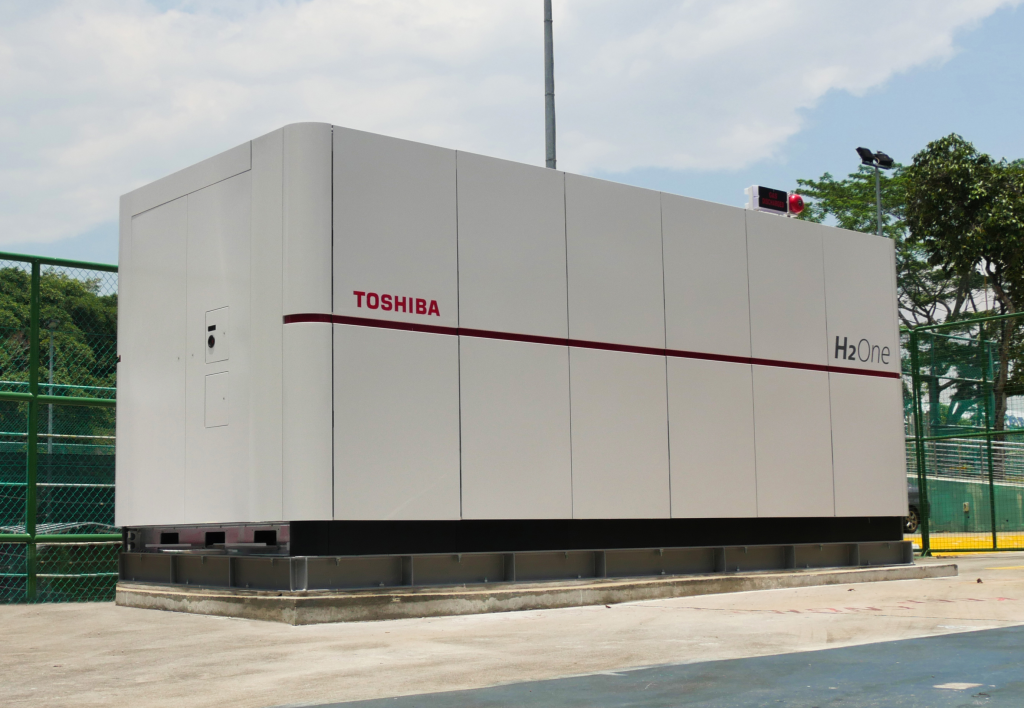Aigerim Akiltayeva | MEL Candidate | Dec 14, 2023.
Mentors: George Patrick Richard Benson, Vancouver Economic Commission
ABSTRACT
This project explores the potential applications of hydrogen in brewery operations, focusing on its use as a heat source in steam generators, particularly for steam-heated vessels crucial in brewing. Additionally, it examines opportunities for hydrogen integration in the Hot Liquor Tank, Mash Tun, and Heat Exchangers, emphasizing sustainability and potential energy cost savings. The broader industrial application of hydrogen-cooled generator heat exchangers is also discussed. Economic feasibility is contingent on the development of local hydrogen infrastructure, including production plants and refueling stations, with government incentives playing a crucial role. Recent initiatives, such as Budweiser’s exploration of direct hydrogen utilization, underscore hydrogen’s viability in breweries, emphasizing the importance of proximity between production and brewing facilities for economic viability and sustainable practices.
INTRODUCTION
In the dynamic industrial environment of Vancouver, addressing industrial emissions has become a pressing concern. The focal point of the capstone project involves conducting a comprehensive analysis through desktop research and an extensive assessment of decarbonization strategies. This endeavor aims to shed light on a sustainable trajectory for Vancouver’s breweries.
The main objective of the capstone project is to serve as a strategic roadmap, guiding the brewery sector in Vancouver towards achieving a net-zero future. The project is tailored to provide the brewery industry with a thorough understanding of the emissions associated with the city’s equipment, utilizing categorized archetypes derived from case studies. Additionally, the project will evaluate the potential role of hydrogen in decarbonizing the operational processes of Vancouver’s breweries.
METHODOLOGY
In the pursuit of a comprehensive understanding of the potential integration of hydrogen as a sustainable fuel source in Vancouver’s brewery sector, a meticulous and multi-faceted methodology was employed. Initially, a detailed analysis of the brewery process was conducted, delving into the intricacies of the brewing stages and identifying the primary equipment involved. This phase aimed to establish a foundational understanding of the existing practices related to energy consumption and emissions in brewery operations. Building upon this foundational analysis, the investigation extended to the current landscape of hydrogen utilization in brewery processes. Instances where hydrogen is already in use as a fuel were scrutinized, and the outcomes and impact on both emissions reduction and overall operational efficiency were examined. This exploration provided valuable insights into the feasibility and effectiveness of hydrogen adoption within brewery contexts. To supplement the findings, a targeted interview with stakeholders in Vancouver, BC, was conducted by exploring perspectives on the potential use of hydrogen in brewery operations. Finally, based on the synthesized insights, recommendations and strategic insights were formulated, aimed at guiding the brewery sector in Vancouver towards a more sustainable and hydrogen-integrated future.

Figure 2. Process of making a brew (MicetCraft, 2021).
RESULTS AND DISCUSSION
| Brewhouse essential equipment | Is it possible to integrate hydrogen? | |
| Heat source SteamElectricity | Steam-heated vessels are a widely utilized system that necessitates a steam generator. This device essentially converts city water into boiling steam, which is subsequently directed through pipes into steam jackets affixed to the vessels. | Yes |
| Hot Liquor/Water Tank (HLT) | The HLT (Hot Liquor Tank) is responsible for heating brewing water and should ideally feature two heating elements or steam jackets for efficient heating with minimal water. | Yes – utilizing wastewater as a resource for hydrogen production (biohydrogen) |
| Mash Tun | Mash tuns come in various types, ranging from basic open vessels to enclosed, heated vessels with stirring paddles. The complexity of features directly correlates with the cost. | Yes, in pumps applications, however with some implications. |
| Heat exchanger | The heat exchanger is employed to lower the temperature of the boiling wort before transferring it to the fermenting vessel. Plate heat exchangers (PHE) are widely used in breweries, with the beer passing through one side and cold water or glycol circulating through the other. | Yes, possible. Hydrogen-cooled generator heat exchangers feature conventional heat transfer surfaces within a precisely engineered framework, ensuring a gas-tight fit and vibration-free operation. This design prioritizes safety, efficiency, and reliability in handling hydrogen as a cooling medium for generators (Technology, 2023). |
Brewery Case 1: Budweiser, United Kingdom
In collaboration with renewable energy solutions provider Protium, Budweiser Brewing Group is implementing the Samlesbury Net Zero initiative, integrating a hydrogen production facility (HPF) with its Lancashire, UK brewery. The HPF, positioned adjacent to the brewery, will supply eco-friendly hydrogen for thermal needs and heating. By employing hydrogen fuel cells for certain vehicles and hydrogen-ready boilers, the project aims to significantly reduce greenhouse gas emissions. Anticipated annual savings of up to 11,000 tons of CO2 align with the UK Government’s net-zero goals and contribute to the target of achieving 5GW of green hydrogen production by 2030.
Brewery Case 2: Carlsberg, Denmark
Carlsberg targets a 30% reduction in beer-to-hand emissions by 2030, focusing on both brewery operations and the consumer stage. The Net Zero Pledge includes technical actions such as decarbonizing thermal energy, sourcing renewable electricity, adopting regenerative agricultural practices, implementing circular packaging systems, electrifying vehicles, and enhancing cooling efficiency. Achievements since 2015 include a 29% reduction in total emissions, a 40% drop in brewery emissions per hectoliter of beer, and a 90% reduction in glass bottle emissions. Future targets emphasize recyclable packaging, bottle and can recycling, reduction in virgin plastics, and increased recycled content.
Brewery Case 3: Asahi Breweries, Japan
Toshiba Energy Systems & Solutions Corporation (Toshiba ESS) has announced the operational deployment of its autonomous hydrogen energy system, “H2One” at Asahi Breweries’ Ibaraki plant in Japan. H2One™ utilizes a pure hydrogen fuel cell system, H2 Rex™, powered by renewable energy, providing stable and CO2-free electricity. The system is controlled by Toshiba ESS’ hydrogen energy management system, H2EMS™. Asahi Group Holdings aims to assess the adaptability of renewable energy by incorporating Toshiba’s H2One™ with newly installed solar panels at their plant. Toshiba ESS continues to support the expansion of hydrogen energy for a low carbon society through its innovative technologies and solutions, with H2One™ having been successfully deployed in various locations, including stations, hotels, and baseball stadiums.

Source: Toshiba (2019)
CONCLUSION
Hydrogen shows promise in brewery operations, especially as a heat source in steam generators, hot liquor tanks, and heat exchanger systems. Its broader industrial use is exemplified in hydrogen-cooled generator heat exchangers. However, economic viability hinges on local hydrogen infrastructure development, requiring production plants and refueling stations. Recent initiatives, like Budweiser’s direct hydrogen utilization, highlight its feasibility, emphasizing the need for local infrastructure. Government incentives are crucial for fostering hydrogen adoption, enabling sustainable practices and industry decarbonization.
REFERENCES
Micet Craft Breweries. (2021). Brewing Process. https://www.micetcraft.com/brewing-process/
Precedence Research. (2022). Hydrogen Generation Market. Precedence Research. https://www.precedenceresearch.com/hydrogen-generation-market
Reload Motors. (2022). Physical Properties of Hydrogen. https://www.reloadmotors.com/news/physical-properties-of-hydrogen
Technology, S. T. (2023). Hydrogen coolers. https://www.sterlingtt.com/products-services/compact-fin-heat-exchangers/hydrogen-coolers/#:~:text=Hydrogen%20heat%20exchangers%20that%20cool,fit%20and%20vibration%2Dfree%20operation.
Toshiba. (2019). Toshiba’s H2One™ Selected to Support Singapore’s Research Efforts in Energy Sustainability. https://www.global.toshiba/ww/news/energy/2019/10/news-20191030-01.html
U.S. Hydrogen Fuel Association . (2020). Hydrogen in fuel applications . Получено из https://www.fchea.org/hydrogen-in-industrial-applications
CONTACT DETAILS
Aigerim Akiltayeva, BEng, MEL
Email: a.akiltayeva@gmail.com
Phone: 236 869 57 15